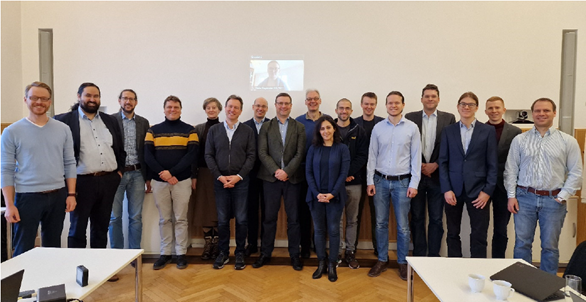QuNET Initiative at Cyber Security Summit 2023
Quantum key transmission in focus: QuNET initiative presents innovative technologies for secure communication at the Cyber Security Council. Demonstration of quantum key exchange and insight into miniaturized light guides and optics.
On 28 November, the National Cybersecurity Council invited representatives from business, science, politics and civil society to the Cybersecurity Council in Berlin. The QuNET initiative was also on site with an exciting setup for quantum key distribution.
The use of innovative technologies to encrypt data is especially important in the areas of security and defense. To this end, the QuNET initiative is developing highly secure communication systems based on modern quantum technologies.
At the Cyber Security Summit, the QuNET consortium presented a demonstration of a quantum key exchange from one satellite to two ground stations. It was not only possible to learn about quantum state transfer, but also to interact practically with the structure, e.g. by blocking a transmission path. Miniaturized light guides and optics could also be admired through a microscope that showed a transmitter chip for quantum key transmission (QKD).
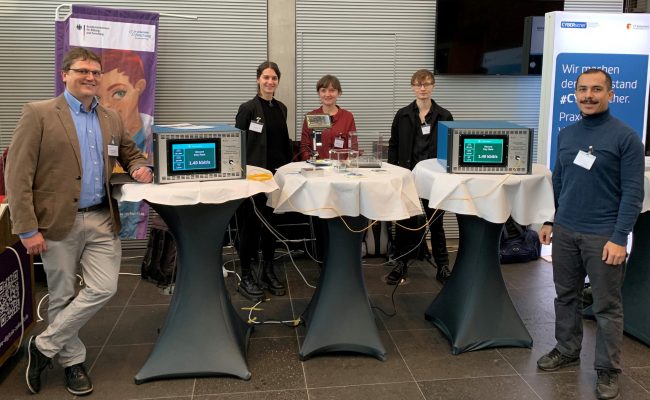
QuNET Initiative at the Digital Summit 2023
Quantum communication to protect digital communications: QuNET initiative presents innovative exhibits on quantum key transmission at the Digital Summit 2023. The development of highly secure systems contributes to the defense of cyber attacks and the protection of the digital society.
Am 20. and On 21 November, the Digital Summit 2023, Market of Digital Opportunities, took place in Jena. Visitors were able to experience a simulation of quantum communication at the Digital Summit, using quantum key exchange between two satellites and a ground station. You could also take a look through a microscope into the world of miniaturized light guides and optics that make up the transmitter chip for key transmission.
Secure communication systems are the core of a digital society. Whether it is the exchange of confidential messages between authorities or the long-term storage of sensitive (company) data: data protection and security are the backbone of the digital society and form the basis of an economy based on innovation.
The QuNET initiative develops highly secure systems based on state-of-the-art quantum technology to protect digital communications from cyber attacks, for example. As part of the Digital Summit, the research consortium will present exciting exhibits on quantum key transmission (QKD).
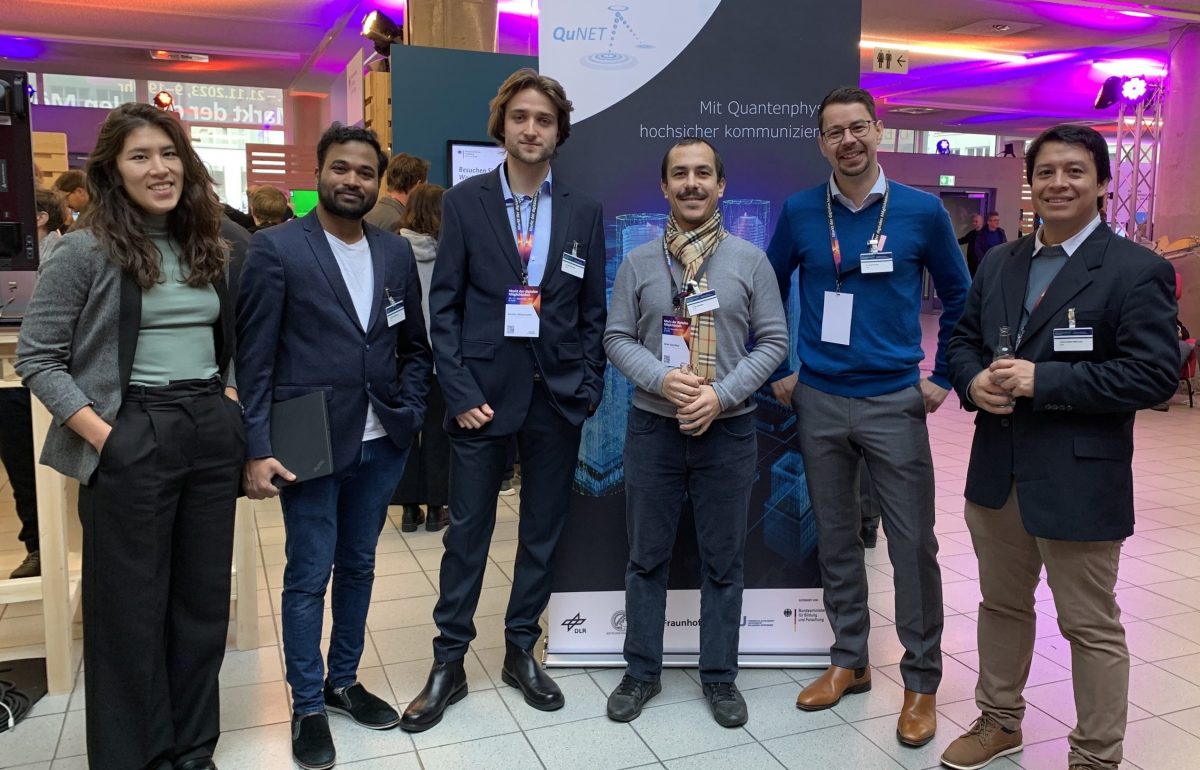
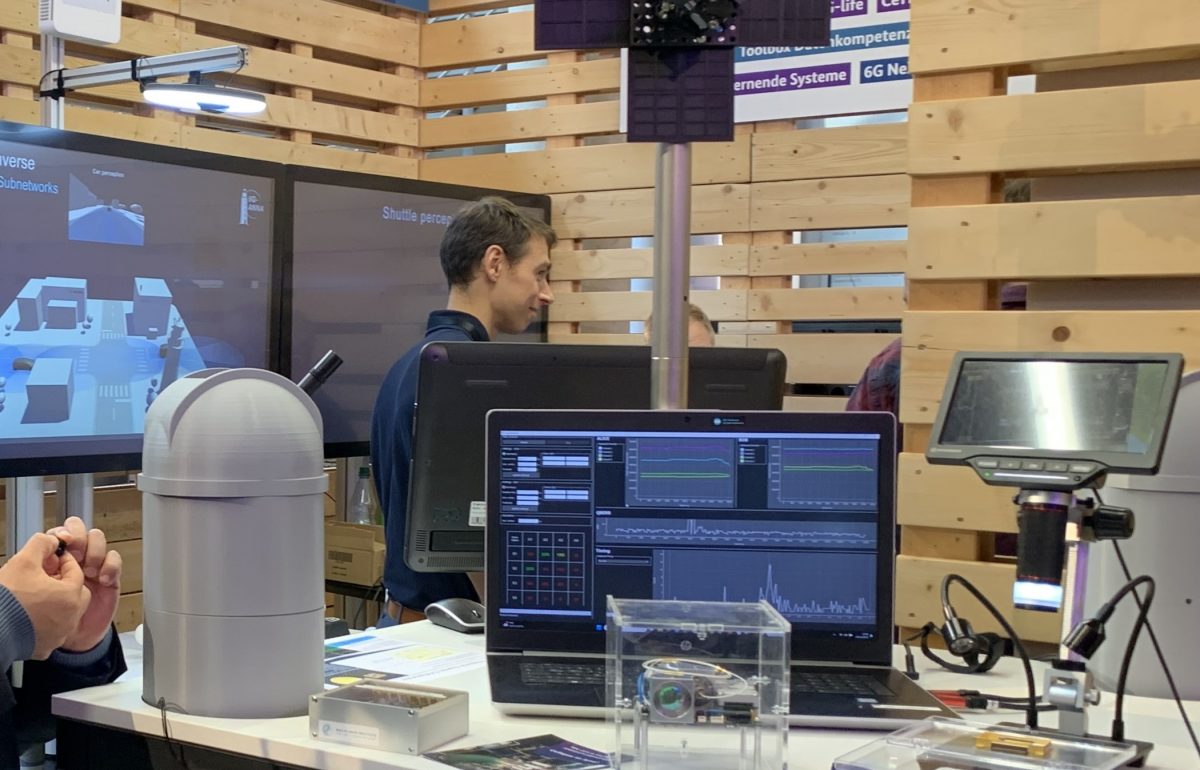
Third QuNET General Assembly in Jena
QuNET consortia discuss project development and future plans at the third general meeting in Jena. Successful key experiment in ad-hoc hybrid-heterogeneous quantum key transmission networks presented.
The third general meeting of the QuNET/QuNET+ consortia took place in Jena from November 9th to 10th. Representatives of the five core institutes: Fraunhofer IOF; Fraunhofer Heinrich Hertz Institute HHI; German Aerospace Center e.V. DLR; Max Planck Institute for the Physics of Light and FAU Erlangen-Nuremberg as well as employees and researchers of the QuNET+ projects, the Federal Ministry of Education and Research, the VDI e.V./VDE spoke about the project development, initial successes and of course about how the projects will develop in the future.
Matthias Goy, researcher at Fraunhofer IOF, gave a lecture on the first successful key experiment 1 on ad-hoc hybrid-heterogeneous quantum key transmission (QKD) networks in metropolitan areas. Our institute director Andreas Tünnermann also reported on current results from the steering committee and took a first look into the future of the QuNET projects. During the meeting, the next key experiments for 2024 and 2025 were also discussed.
In addition, there were two exciting workshops for the participants. The workshop of the Quantum Communication Germany “SQuaD” project focused on technology transfer and standardization. In a qp-tech.edu training course on the topic of “Introduction to quantum technologies”, the participants dealt with quantum imaging, quantum sensors and metrology. The theoretical impulses were underpinned by practical experiments.
“This was the first face-to-face meeting of this kind for the QuNET initiative. It was therefore impressive to see how closely the individual projects have already grown together and are working towards a common goal,” summarizes Dr. Friederike Fohlmeister (DLR), the third QuNET general meeting.
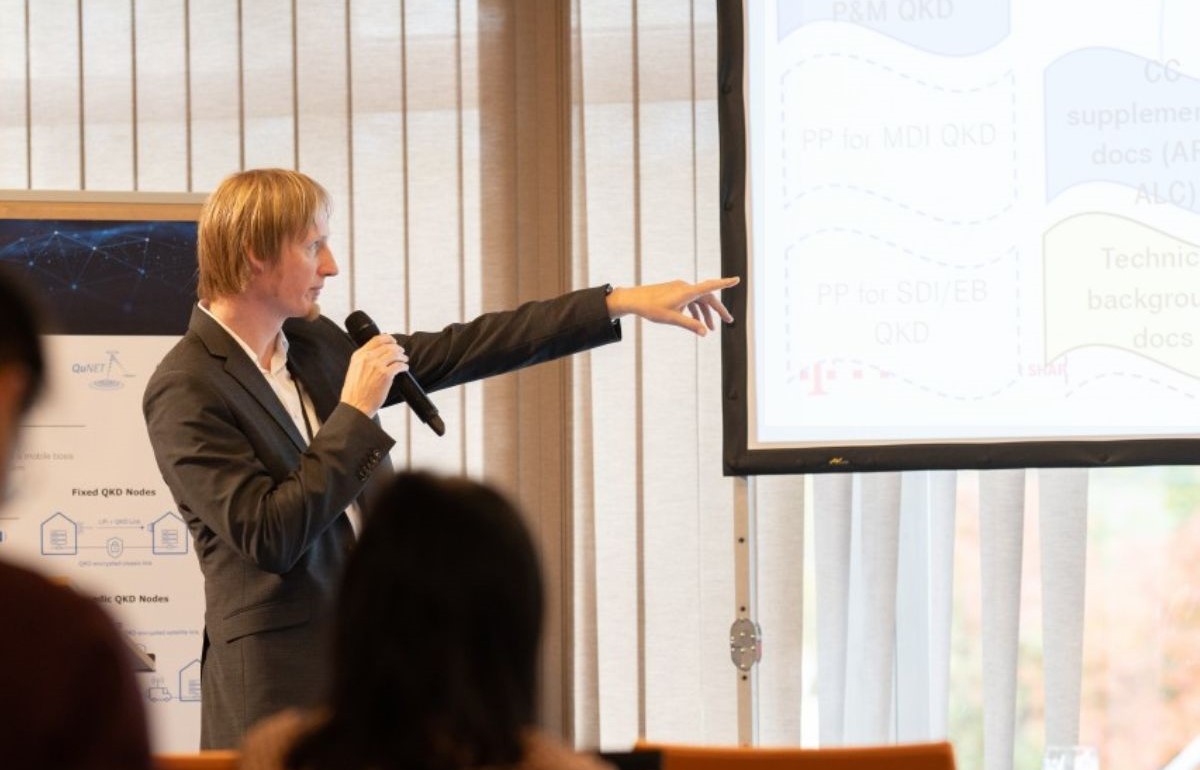
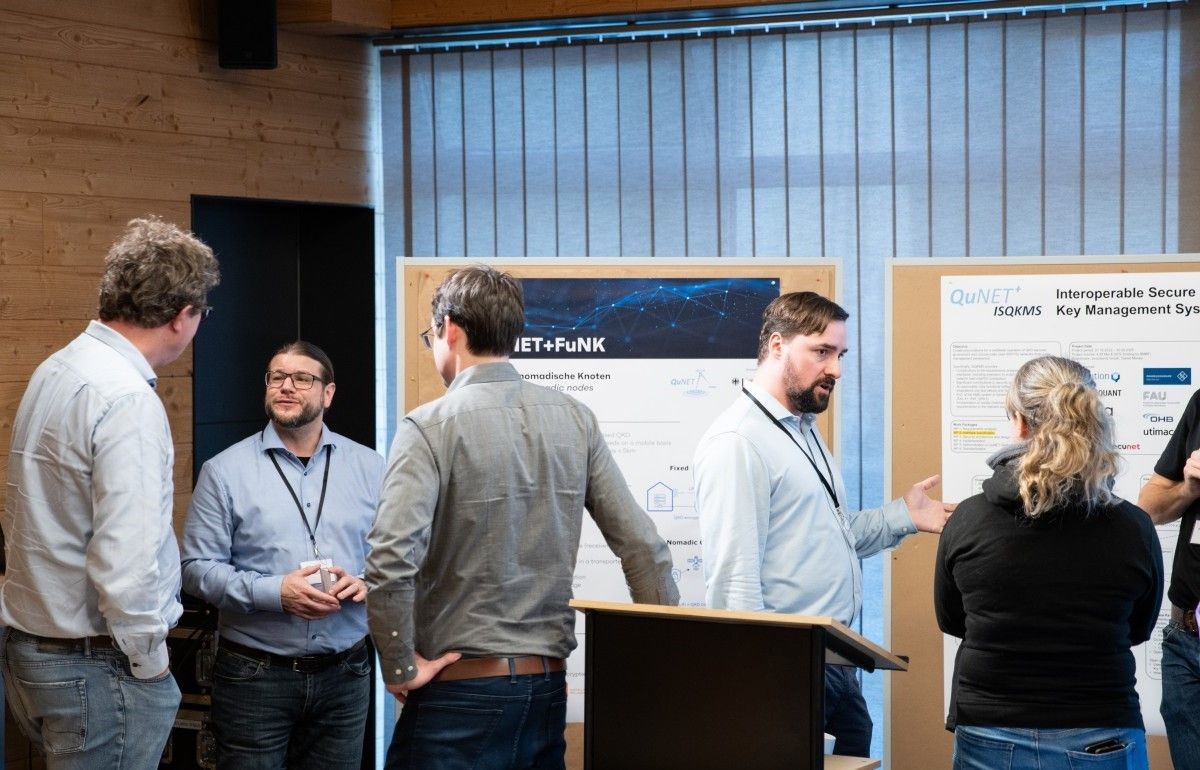
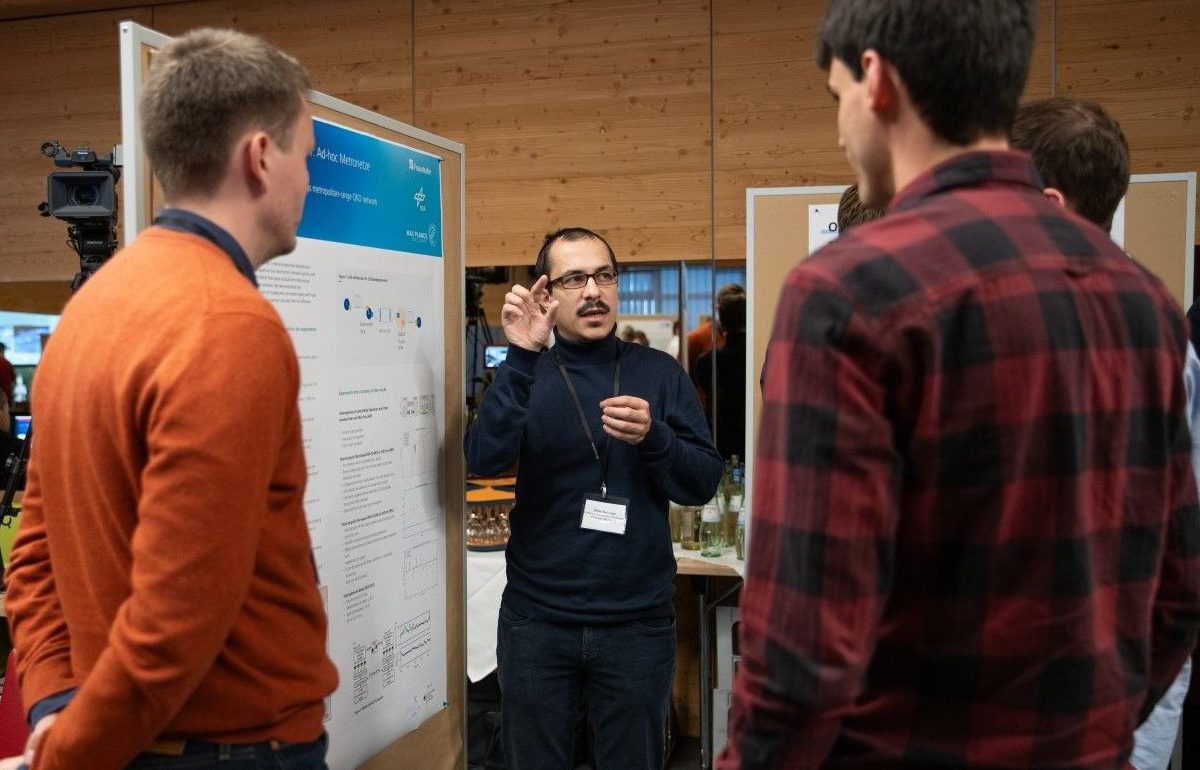
Towards secure communication of the future
Researchers from Jena, Berlin, Erlangen and Wessling have successfully exchanged quantum keys between two points using a combination of free-space and fiber connections. The experiment was carried out as part of the QuNET initiative, a pilot project funded by the Federal Ministry of Education and Research (BMBF).
Another milestone has been reached on the way to highly secure communication of the future. In a key experiment, the institutes involved – the Max Planck Institute for the Physics of Light, the Friedrich-Alexander University Erlangen-Nuremberg, the DLR Institute of Communications and Navigation as well as the two Fraunhofer Institutes for Applied Optics and Precision Mechanics IOF and the Heinrich Hertz Institute HHI – showed that quantum-secure point-to-point connections can be realized. As part of a key experiment, they established a quantum-secure connection on a test track almost two kilometers long in Jena. They combined transmissions of quantum keys via free-space and fiber connections and achieved transmission rates in the kilobit range per second during the day.
To gain an insight into what was happening, the Federal Ministry of Education and Research (BMBF) and VDI/VDE Innovation Technology visited the experiment in Jena on May 23, 2023. Daniel Behrendt (BMBF), Dirk Ziemann (BMBF), Fabienne Haupert (VDI/VDE) and Kristian Döbrich (VDI/VDE) visited the laboratories and locations of the experiment. The representatives of the individual institutes – Florian Moll (DLR), Ömer Bayraktar (MPL), Nino Walenta (HHI), Anja Milde, Andreas Tünnermann, Thorsten Goebel, Fabian Steinlechner and Matthias Goy (all IOF) – then discussed current and future challenges in the field of data security and quantum communication with the delegation.
You can find the full press release from Fraunhofer IOF here.
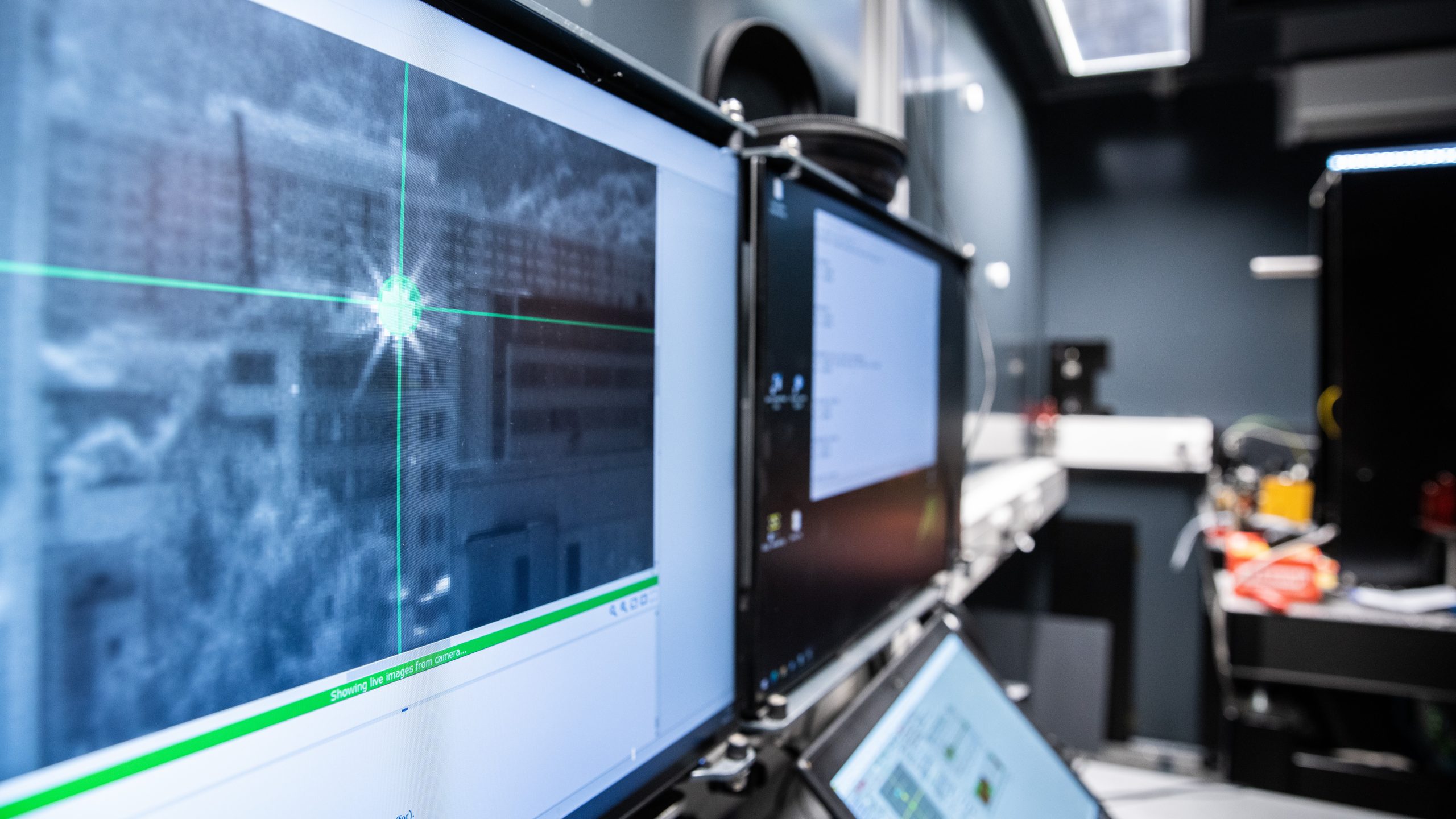
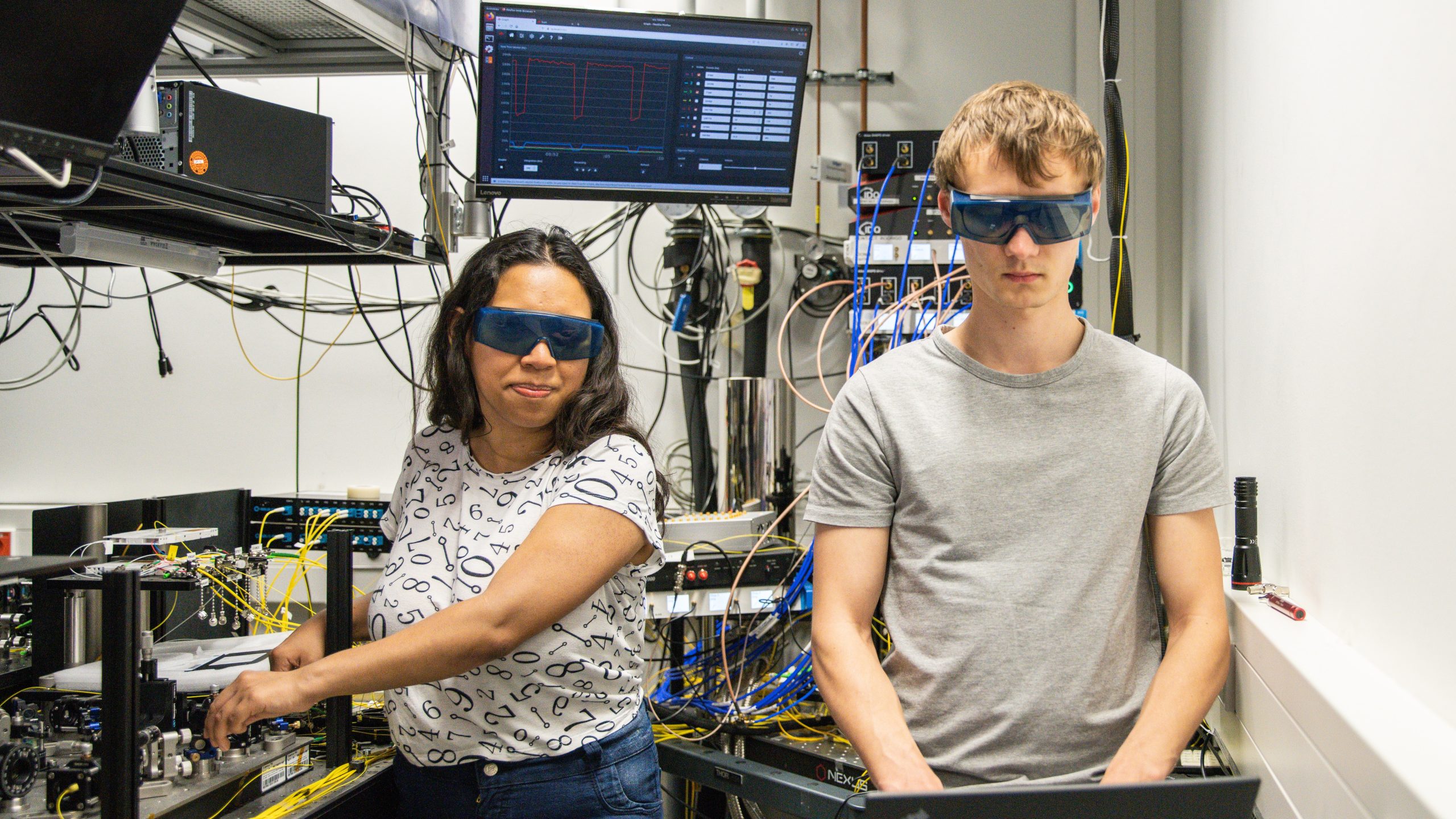
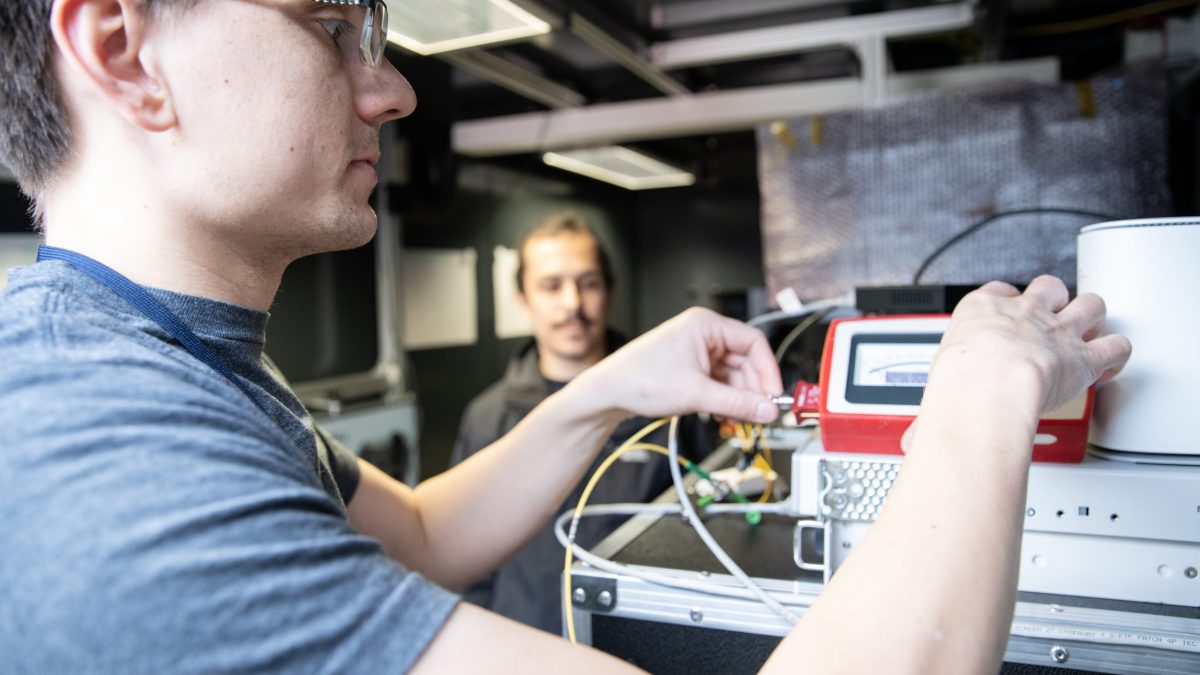
Stark-Watzinger: Secure Germany's place at the forefront of quantum technologies
The federal government, together with scientific organizations, is providing three billion euros for future technology.
The Federal Cabinet today approved the quantum technology action plan. It was developed under the leadership of the Federal Ministry of Education and Research (BMBF).
“Quantum technologies are a key technology of the future with enormous potential for our society and economy. Their applications range from the simulation of new drug ingredients to tap-proof communication. With the new action plan, we want to secure Germany’s place at the forefront of quantum technologies and our technological sovereignty. The action plan forms the common political framework and focuses on three fields of action: putting quantum technologies into practice, driving forward technology development in a targeted manner, and creating excellent framework conditions for a strong ecosystem. The Federal Government, together with the scientific organizations, will provide around three billion euros for this purpose.”
Background
The quantum technologies action plan forms the coordinating strategic framework for the Federal Government’s activities in quantum technologies in the years 2023 to 2026. The Federal Government is providing a total of 2.18 billion euros for this purpose. The scientific organizations are contributing 850 million euros. Under the leadership of the Federal Ministry of Education and Research (BMBF), the Federal Ministry for Economic Affairs and Climate Protection (BMWK), the Federal Ministry of Finance (BMF), the Federal Ministry of the Interior and Home Affairs (BMI), the Federal Ministry of Defense (BMVg), the Federal Ministry of Health (BMG) and the Federal Ministry for Digital and Transport (BMDV) contributed to the draft of the action plan.
The cross-departmental concept is divided into three fields of action: The first field of action deals with the development of application-ready products, which will help Germany to take a self-determined path in international competition. The second field of action focuses on targeted technology development. Germany is to become a key player, particularly in the field of quantum computing, and secure future markets by helping to shape standards and norms. The third field of action focuses on promoting a strong ecosystem. The focus here is on founders, networking between science and business, and the creation and expansion of a strong skilled workforce.
More information
www.bmbf.de/handlungskonzept-quantentechnologien
www.quantentechnologien.de/handlungskonzept-quantentechnologien
QuNET at Hannover Messe 2023
After a break of almost three years, the Hannover Messe 2023 took place again in its usual format for the first time. From April 17th to April 21st, around 4,000 companies from mechanical engineering, the electrical and digital industries, and the energy industry presented their technologies and solutions for a networked and climate-neutral industry. The Federal Ministry of Education and Research (BMBF) is also represented there with its QuNET project. Friederike Fohlmeister from the German Aerospace Center (DLR) and Roman Mouchel from the Fraunhofer Institute for Applied Optics and Precision Engineering IOF were on site to answer questions and provide suggestions to the numerous visitors.
Among those interested was Federal Minister of Education and Research Bettina Stark-Watzinger, who visited the stand on the first day of the fair.
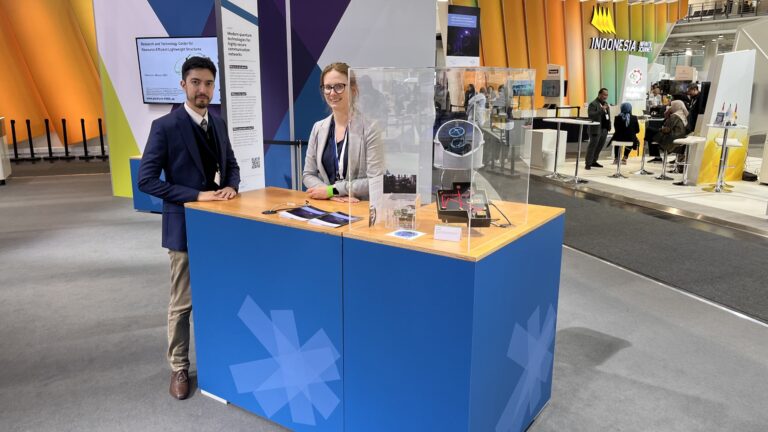
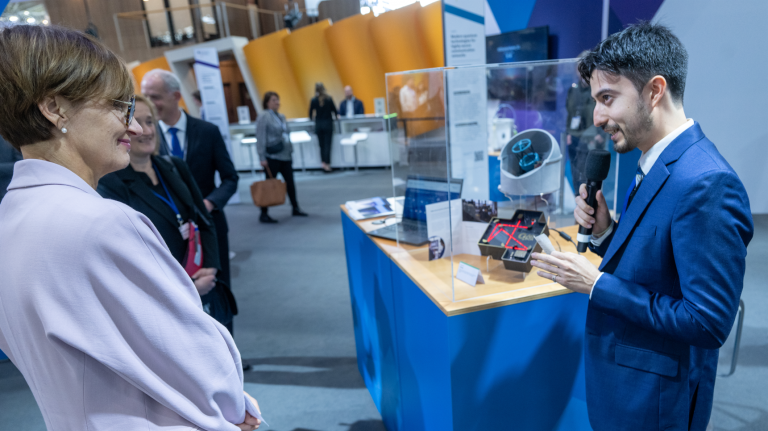
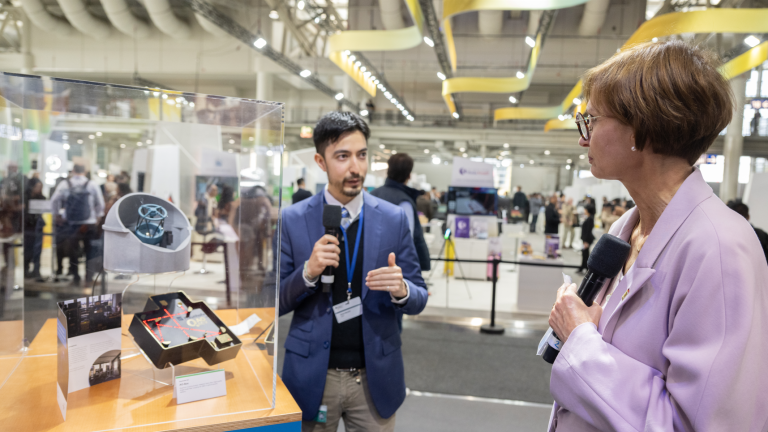
National Conference on IT Security Research of the BMBF
The Federal Ministry of Education and Research (BMBF) is organizing the National Conference on IT Security Research 2023 (#its_konf23) from March 13 to 15, 2023. The motto is: “Strengthening the digitally networked society.”
At the event in Cafe Moskau in Berlin, participants can expect a varied program of scientific and socio-political content in the form of discussions, presentations, exhibitions and workshops.
All important information about the conference can be found here www.forschung-it-sicherheit-kommunikationssysteme.de/nationale-konferenz-it-sicherheitsforschung-2023
Specialist group meeting of the QuNET initiative
From February 28 to March 1, 2023, 65 members of the specialist groups met at the Fraunhofer Institute for Applied Optics and Precision Engineering in Jena. The aim of the meeting was to exchange information on the latest research. The first day began with a presentation of the overall network architecture and security aspects. This was followed by a presentation of components and interfaces as well as scenarios and key experiments. After each presentation, a World Café was held in which the experts could exchange ideas on the current state of research. The last item on the program was the poster session, with each QuNET+ project being presented using a poster. The first day ended with a shared dinner.
The second day of the meeting focused on the free-beam and fiber systems. After the presentations of these systems, further World Cafés followed, with the focus on the exchange of ideas between the participants. At the end of the meeting, a general summary of the new findings was given, followed by the farewell of the participants.
At the specialist group meeting, many insights were gained, contacts were made and the work of the QuNET initiative was advanced. We would like to thank all participants who contributed to the success of the meeting and look forward to the next meeting.
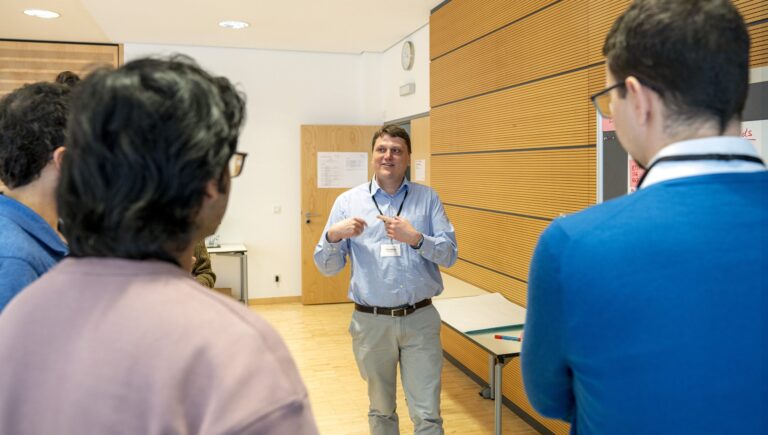
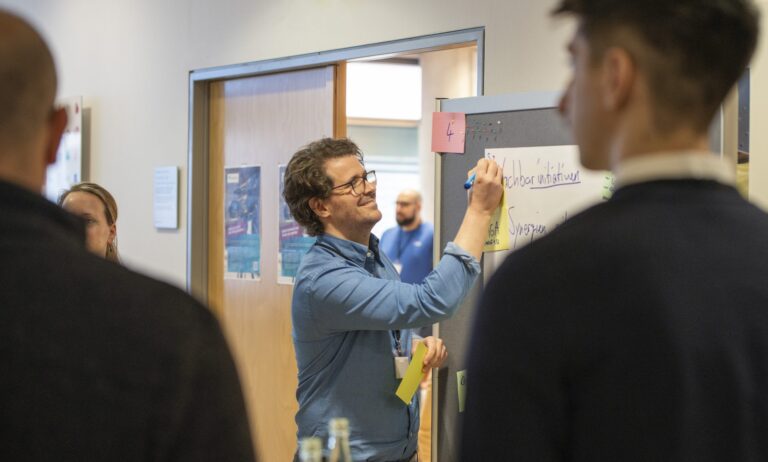
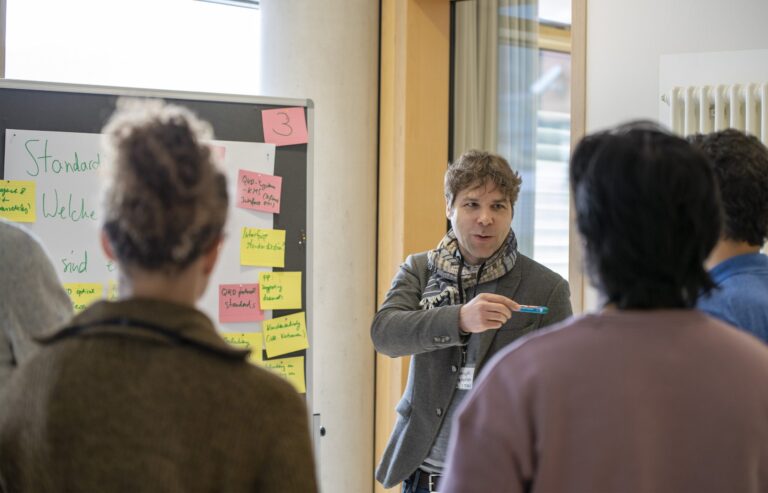
Start of the Bavarian state initiative »QuKomIn«
The Bavarian project »Quantum communication infrastructure (QuKomIn)« started at the beginning of November 2022. The aim of the initiative is to set up a real test infrastructure for quantum communication in the form of a fiber optic network with satellite connection and application centers in the Erlangen/Nuremberg and Munich/Oberpfaffenhofen area. The specific route of the fiber optic network has already been examined in a feasibility study funded by the Free State of Bavaria. The focus of QuKomIn will be on the needs of the authorities and industrial users. As part of the Bavaria-Saxony-Thuringia state initiatives, QuKomIn is in close communication with the QuNET initiative.
The project is managed by the Max Planck Institute for the Physics of Light in Erlangen. The Friedrich-Alexander University Erlangen-Nuremberg (Department of Physics), the Fraunhofer Institute for Integrated Circuits, the German Aerospace Center (Institute for Communications and Navigation) and the Ludwig Maximilian University of Munich (Faculty of Physics) are also involved as project partners. The initiative is funded by the Bavarian State Ministry for Economic Affairs, Regional Development and Energy with funds totaling around €15 million. The duration is 5 years.
QuNET as exhibitor at SPIE Photonics West 2023
SPIE Photonics West took place in San Francisco, USA, from January 31 to February 1, 2023. It is one of the largest photonics trade fairs in the world and is accompanied by an optics and photonics conference. Around 22,000 visitors from over 85 countries were on site to view the more than 1,400 international exhibitors. The QuNET initiative was also represented there with exhibits and colleagues. Many visitors came to the booth and showed a strong interest in the latest developments in the field of quantum technologies. Exhibits were on display from the German Aerospace Center (DLR) Institute of Communications and Navigation and the Fraunhofer Institute for Optics and Precision Engineering IOF, among others.
Friedrich-Alexander University as fifth consortium partner
Prof. Dr. Christoph Marquardt, sub-project leader at the Max Planck Institute for the Science of Light (MPL) in Erlangen, has been appointed to the newly created chair for Optical Quantum Technologies at the Friedrich-Alexander University Erlangen-Nuremberg (FAU). This means that part of the research group, which is significantly involved in QuNET and develops systems for quantum key exchange and entanglement sources, is moving from the MPL to FAU. FAU has therefore been a consortium partner in the QuNET joint project since January 1, 2023.
Umbrella project SQuaD brings together key partners
Germany is pooling its expertise in quantum communication to enable secure transmission of information. After intensive research in the field of quantum-based key distribution, the technological leap into the economy is now imminent: From September 2022, the Federal Ministry of Education and Research will be funding 36 facilities in the innovation hub for quantum communication to network research institutes and companies. The Fraunhofer Institute for Applied Optics and Precision Engineering IOF and its spin-off Quantum Optics Jena are also involved as partners in the accompanying umbrella project Quantum Communication Germany, or SQuaD for short.
SQuaD is coordinated by the Federal Institute of Physics and Technology (PTB) in close cooperation with the Federal Office for Information Security (BSI). Other partners are:
- Keequant GmbH, Fürth
- Quantum Business Network UG, Munich
- Saarland University, Saarbrücken
- Fraunhofer Institute for Systems and Innovation Research ISI, Karlsruhe
- Fraunhofer Institute for Applied Optics and Precision Engineering IOF, Jena
- Fraunhofer Heinrich Hertz Institute HHI, Berlin
- Leibniz University, Hanover
- Quantum Optics GmbH, Jena
